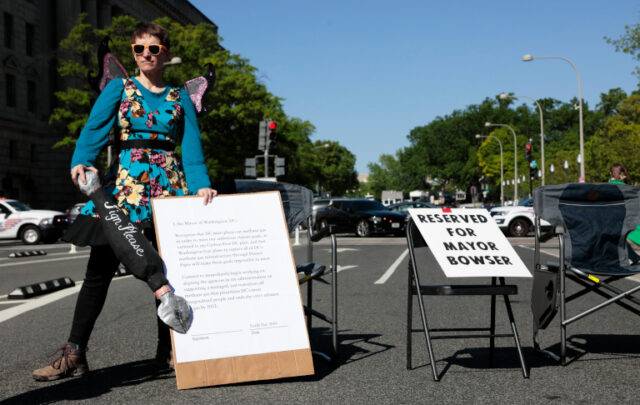Click on the headline (link) for the full text.
Many more articles are available through the Energy Bulletin homepage
58 Percent More Concerned About Global Warming Now Than Two Years Ago; Bipartisan 4 Out of 5 Urge Energy, Climate As Top Issues for Bush & 2006/2008 Elections.
WASHINGTON, D.C. With concerns up sharply about global warming, Americans of all political beliefs are disgruntled about weak federal leadership on global warming and energy issues, while lining up solidly behind the growing number of state and local efforts to rein in climate change problems and to tap alternative fuel sources, according to a major new Opinion Research Corporation (ORC) national survey released today by the nonprofit and nonpartisan Civil Society Institute (CSI) and 40MPG.org, which is a project of the CSI think tank.
The CSI/40mpg.org survey found that 58 percent of Americans – including 57 percent of independents and 42 percent of conservatives — are more concerned about global warming today than they were two years ago. Also, more than three out of four Americans (76 percent) — including two out of three conservatives — think the federal government is not doing “enough to address global warming and develop alternative energy sources in order to reduce our dependence on foreign oil.” At the same time, more than four out five Americans (83 percent) – including 77 percent of conservatives — said that “in the absence of federal leadership” today, they support the fast-growing number of pushes by “state and local officials to curb global warming and promote new energy resources.”
Other key survey findings: 77 percent of Americans think that “developing alternative or renewable energy sources and reducing U.S. dependence on foreign oil should be President Bush’s top priority for the balance of his term in office”; and 83 percent of Americans – including 72 percent of conservatives and 85 percent of independents – would like to see more attention paid to global warming during the 2006 Congressional elections and the 2008 Presidential elections.
(15 March 2006)
Found and commented upon by David Roberts at Gristmill. 40mpg.org has press releases about previous poll results in their News section.
Poll: Most Americans fear vulnerability of oil supply
Frank Sesno, CNN
WASHINGTON (CNN) — Although Americans don’t believe the country faces an imminent energy crisis, most believe there are “major problems” — from potential oil shortages to possible terrorist attacks — and they are harshly critical of the leadership on the issue from the White House, according to a new CNN/USA Today/Gallup poll.
Despite President Bush’s focus on energy in his State of the Union speech, in which he said America is “addicted to oil,” those polled gave the president low marks on the issue.
…The poll, which was released Wednesday afternoon, also indicates that roughly three out of four Americans — 77 percent — fear the supply of oil will not be able to keep up with global demand. Three in 10 said they believe the world will run short of oil within the next 25 years.
That perception is in conflict with forecasts from the Energy Information Agency, the official arm of the U.S. government that keeps energy statistics. The agency estimates that the oil supply will be able to meet the demand, which is expected to skyrocket by 40 percent in the next 20 years — driven by rising U.S. consumption and booming economies in China and India.
(16 March 2006)
Both Reds and Blues go green on energy
Michael Dimock, Pew Research Center for the People & the Press
But Parties Split Internally on Environmental Protections
————
With high fuel prices and instability in the Middle East, Americans are increasingly concerned about the nation’s energy situation. In January, 58% rated “dealing with the nation’s energy problem” a top priority, up from just 47% a year ago and 40% in January of 2003.
And while finding new energy and protecting the environment are often seen as conflicting goals, the public makes no such distinction. In concert with rising energy worries, Americans are becoming increasingly anxious about the environment. In January, 57% rated “protecting the environment” a top priority, up from 49% a year ago and just 39% in 2003.
The outgrowth of this concern about both energy and the environment is that the public expresses almost universal support for solutions that address both problems at the same time. Fully 86% favor the government requiring better fuel efficiency standards for cars, trucks and SUVs, and 82% favor increased federal funding for research on wind, solar and hydrogen energy.
Even more striking in today’s politicized environment, is the level of bipartisan consensus behind these proposals.
(28 February 2006)
Pew Poll: Curing an oil addiction
Pew Research Center for the People & the Press
85% See U.S. Addicted to Oil – 50% Say We Can Quit
————-
 While just three-in-ten approve of the president’s handling of energy policy (55% disapprove), the vast majority agree with the president’s assertion that the nation is addicted to oil. Overall, 85% agree with this statement, including 82% of both Republicans and Democrats along with 90% of independents. It is an idea that finds broad assent even among those who paid little attention to Bush’s speech; people who paid no attention at all to news about the State of the Union address are about as likely to say the U.S. is addicted to oil as are those who followed the speech very closely.
While just three-in-ten approve of the president’s handling of energy policy (55% disapprove), the vast majority agree with the president’s assertion that the nation is addicted to oil. Overall, 85% agree with this statement, including 82% of both Republicans and Democrats along with 90% of independents. It is an idea that finds broad assent even among those who paid little attention to Bush’s speech; people who paid no attention at all to news about the State of the Union address are about as likely to say the U.S. is addicted to oil as are those who followed the speech very closely.
Half of Americans believe the U.S. can end its reliance on foreign oil sources within the next two decades, while 42% think it cannot. Democrats are considerably more pessimistic in this regard than are Republicans. Most Republicans (58%) say America can kick its oil habit within the next 20 years, compared with just 43% of Democrats.
 The public continues to overwhelmingly back higher fuel efficiency standards and research on alternative energy sources as a means of addressing the nation’s overall energy needs. Nuclear energy, while gaining some support over the past five months, remains a relatively unpopular option. And while public support for tax cuts for alternative energy has increased slightly, fewer Americans now favor providing tax cuts to energy companies to do more oil exploration.
The public continues to overwhelmingly back higher fuel efficiency standards and research on alternative energy sources as a means of addressing the nation’s overall energy needs. Nuclear energy, while gaining some support over the past five months, remains a relatively unpopular option. And while public support for tax cuts for alternative energy has increased slightly, fewer Americans now favor providing tax cuts to energy companies to do more oil exploration.
Currently, 44% favor promoting the increased use of nuclear power, while 49% are opposed. Overall support for nuclear energy is up slightly from 39% in September. Republicans (56%) are much more likely than Democrats (39%) or independents (38%) to favor this option.
 On the heels of reports of record profits at Exxon/Mobil and other energy corporations, support for giving tax cuts to energy companies to do more oil exploration has decreased from 52% in September to 44% today. While this shift in opinion has occurred across the board, there remains a steep division of opinion across party lines. Currently 57% of Republicans favor tax cuts to energy companies to stimulate exploration, compared with 37% of Democrats and 38% of independents.
On the heels of reports of record profits at Exxon/Mobil and other energy corporations, support for giving tax cuts to energy companies to do more oil exploration has decreased from 52% in September to 44% today. While this shift in opinion has occurred across the board, there remains a steep division of opinion across party lines. Currently 57% of Republicans favor tax cuts to energy companies to stimulate exploration, compared with 37% of Democrats and 38% of independents.
But there is a consensus across party lines regarding other energy options. In particular, 86% of Americans favor requiring better fuel efficiency for cars, trucks and SUVs, 82% want increased federal funding for research on wind, solar and hydrogen technology, and 78% would favor tax cuts to energy companies researching these kinds of alternative energy sources. Roughly two-in-three favor spending more on subway, rail and bus systems and increased funding for ethanol research. On most of these proposals Republicans and Democrats are largely in agreement. The only ideas that garner somewhat less support from Democrats than from Republicans are tax cuts to energy companies to develop wind, solar and hydrogen technology and federal funding for ethanol research.
 Just over half of the public (52%) say that more energy conservation and regulation on energy use and prices should be the priority for U.S. energy policy, while 41% believe the U.S. should emphasize exploration, mining and drilling and the construction of new power plants. This balance of opinion has fluctuated only marginally over the past five years. Beyond partisanship, there are substantial divides between men and women, and younger and older Americans in this view. Women favor conservation over exploration by a 57% to 36% margin while men are divided evenly (47% to 46%). And people age 18-29 favor conservation by more than two-to-one (66% to 28%) while older generations are more divided, with those ages 65 and older most likely to see exploration as the main priority (49%).
Just over half of the public (52%) say that more energy conservation and regulation on energy use and prices should be the priority for U.S. energy policy, while 41% believe the U.S. should emphasize exploration, mining and drilling and the construction of new power plants. This balance of opinion has fluctuated only marginally over the past five years. Beyond partisanship, there are substantial divides between men and women, and younger and older Americans in this view. Women favor conservation over exploration by a 57% to 36% margin while men are divided evenly (47% to 46%). And people age 18-29 favor conservation by more than two-to-one (66% to 28%) while older generations are more divided, with those ages 65 and older most likely to see exploration as the main priority (49%).
(7 February 2006)
The section on energy is in the middle of the online document





